Black Walnut
Black walnut, also known as Eastern Black Walnut, is a delicious and nutritious nut with pulpy flesh inside in its raw state. The tree grows well in well drained fertile soil. It is a deciduous tree of the hickory family. Find out all about this nutritious and delicious nut in the article below.
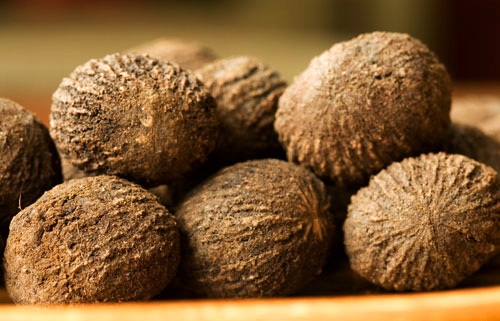
Black Walnut
Table Of Content
Black Walnut Scientific Name
Black walnut is scientifically known as Juglans nigra.
Black Walnut Description
Looks: In its raw state the nuts are evenly round and green in color. In this state the nuts are more of fruits with soft and fleshy pulp. When they ripen they become hard and turn unevenly roundish in shape. The color also changes into dark brown. Flesh inside the nutty cover of the fruit remains the same as raw after ripening also. The seed inside is brownish black and very hard.
Taste: The flesh inside black walnut’s hard cover tastes like apple pulp. It is sweet and mildly juicy. The nut tastes sweetish bitter.
Smell: The fruit of walnut smells like peach.
Leaves: This fruit tree bears compound leaves. Each compound leaf is about 12 inches to 24 inches long. Each leaf is composed of 15 to 23 leaflets of about 3 inches long.
Black Walnut Distribution
Walnut trees grow well in temperate zones. It is vastly found in California in USA. It is also found in abundance in Eastern North America, Minnesota, Texas and almost all over Europe.
Black Walnut Nutritional Facts
This nut is very nutritious. Find out its detailed nutrition content in the chart below.
| Nutrient | Amount |
| Calcium | 61 mg |
| Magnesium | 201 mg |
| Iron | 3.12 mg |
| Phosphorus | 513 mg |
| Sodium | 2 mg |
| Potassium | 523 mg |
| Copper | 1.360 mg |
| Zinc | 3.37 mg |
| Selenium | 17.0 mcg |
| Manganese | 3.896 mg |
| Vitamin A, RAE | 2 mcg_RAE |
| Vitamin A, IU | |
| Vitamin B-12, added | 0.00 mcg |
| Vitamin B-12 | 0.00 mcg |
| Vitamin C, total ascorbic acid | 1.7 mg |
| Vitamin-E, added | 0.00 mg |
| Vitamin-E (alpha-tocopherol) | 1.80 mg |
| Vitamin B-6 | 0.583 mg |
| Vitamin-K (phylloquinone) | 2.7 mcg |
| Riboflavin | 0.130 mg |
| Thiamin | 0.057 mg |
| Pantothenic acid | 1.660 mg |
| Niacin | 0.470 mg |
| Folic acid | 0 mcg |
| Folate, total | 31 mcg |
| Folate, DFE | 31 mcg_DFE |
| Folate, food | 31 mcg |
| Betaine | 0.5 mg |
| Choline, total | 32.1 mg |
| Retinol | 0 mcg |
| Tocopherol, gamma | 28.48 mg |
| Tocopherol, beta | 0.00 mg |
| Tocopherol, delta | 1.44 mg |
| Fatty acids, total saturated | 3.368 mg |
| 4:0 | 0.000 g |
| 8:0 | 0.000 g |
| 6:0 | 0.000 g |
| 12:0 | 0.000 g |
| 10:0 | 0.000 g |
| 15:0 | 0.000 g |
| 14:0 | 0.000 g |
| 17:0 | 0.000 g |
| 16:0 | 1.923 g |
| 20:0 | 0.000 g |
| 18:0 | 1.445 g |
| 22:0 | 0.000 g |
| 14:1 | 0.000 g |
| 16:1 undifferentiated | 0.063 g |
| 15:1 | 0.000 g |
| 18:1 undifferentiated | 14.533 g |
| 17:1 | 0.000 g |
| 20:1 | 0.408 g |
| Fatty acids, total polyunsaturated | 35.077 g |
| 22:1 undifferentiated | 0.000 g |
| 18:3 undifferentiated | 2.006 g |
| 18:2 undifferentiated | 33.072g |
| 18:3 n-6 c,c,c | 0.000 g |
| 18:3 n-3 c,c,c | 2.006 g |
| 20:2 n-6 c,c | 0.000 g |
| 18:4 | 0.000 g |
| 20:4 undifferentiated | 0.000 g |
| 20:3 undifferentiated | 0.000 g |
| 22:5 n-3 | 0.000 g |
| 20:5 n-3 | 0.000 g |
| 22:6 n-3 | 0.000 g |
| Phytosterols | 108 mg |
| Cholesterol | 0 mg |
| Campesterol | 5 mg |
| Stigmasterol | 0 mg |
| Beta-sitosterol | 103 mg |
| Threonine | 0.721 g |
| Tryptophan | 0.318 g |
| Leucine | 1.684 g |
| Isoleucine | 0.966 g |
| Methionine | 0.467 g |
| Lysine | 0.713 g |
| Phenylalanine | 1.094 g |
| Cystine | 0.462 g |
| Valine | 1.271 g |
| Tyrosine | 0.740 g |
| Histidine | 0.672 g |
| Arginine | 3.618 g |
| Alanine | 1.048 g |
| Glutamic acid | 5.152 g |
| Aspartic acid | 2.433 g |
| Serine | 1.225 g |
| Glycine | 1.189 g |
| Proline | 0.926 g |
| Water | 4.56 g |
| Energy | 2584 kj |
| Energy | 618 kcal |
| Total lipid (fat) | 59.00 g |
| Protein | 24.06 g |
| Carbohydrate, by difference | 9.91 g |
| Ash | 2.47 g |
| Sugars, total | 1.10 g |
| Fiber, total dietary | 6.8 g |
| Glucose (dextrose) | 0.05 g |
| Sucrose | 1.00 g |
| Fructose | 0.05 g |
| Starch | 0.24 g |
| Lactose | 0.00 g |
| Maltose | 0.00 g |
| Caffeine | 0 mg |
| Alcohol, ethyl | 0.0 g |
| Theobromine | 0 mg |
| Carotene, alpha | 0 mcg |
| Carotene, beta | 24 mcg |
| Lycopene | 0 mcg |
| Cryptoxanthin, beta | 0 mcg |
| Lutein + zeaxanthin | 9 mcg |
Black Walnut Health Benefits
Black walnut is a perfect blend of low carbohydrate along with protein and vegetable fats. Being extremely nutritious the nut is very beneficial for health.
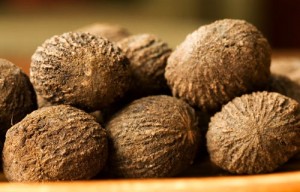 Picture 2 – Black Walnut Photo
Picture 2 – Black Walnut Photo
- These nuts are consumed to heal many physiological maladies.
- Unlike other nuts black walnut promote weight loss and boost up over all fitness.
- It contains Omega-3 polyunsaturated fats which are essential fats for human body.
- These nuts contain linolenic acids which prevents heart attacks by burning the extra fatty materials and toxins along with balancing body sugar levels.
- The natural tannins present in these nuts help in killing yeasts, parasites, and fungi inside human intestines, thus preventing from intestinal worms.
- Omega-3 fatty acids’ effects help in controlling the blood pressure levels.
- These fatty acids lower the bad cholesterol levels thus promoting good cholesterol levels and helping controlling diabetes.
- The same fatty acids decrease inflammations and help improve functioning of lungs. Thus treating asthma.
- This nut is thought to contain juglone that are anti-tumor agents. Thus this nut might help in treatment of cancer.
- Powder of black walnut’s hull is used to treat acne, blisters, eczema and ringworm.
- Consumption of the hull powder also treats intestinal constipation.
- The hull powder paste treats all types of fungal infections on skin.
- Even the leaf of this nut tree can be used to treat many skin problems.
Black Walnut Side Effects
Black walnut is undoubtedly extremely beneficial for health, but it has many side effects as well. Thus it is always advisable to consult an expert before consuming black walnut products. Count down the side effects below.
- Consumption of black walnut more than average can cause loose stool.
- Over consumption of this nut can even increase the risk of developing diarrhea.
- People who are allergic to nuts or specifically black walnut or any of the properties present in the black walnut can develop skin rashes, hives or even swellings after consuming it.
- Sometimes people allergic to nuts can even stand the risk of being fatal after consuming black walnut.
- Surveys report that people may even develop skin tumors as a result of consuming these nuts.
How To Grow Black Walnut
Sowing :
- Take an unevenly straight black walnut limb. Lay it on a southwards sloping ground.
- Grasses should be removed clean on and around the sowing zone. The dirt on the soil needs to be loosened with a hoe.
- Gather some soil from around a black walnut tree and smear around the sowing zone of the new seed.
- Sow the black walnut seeds with their husks into the soil. The seeds should be sown 6 inches distant from each other.
Caring: Make a thick bed of leaves from other black walnut leaves all around the sowing area. Compost of the leaves helps the seeds to grow perfectly.
Watering: The seeds should be watered regularly, else they stand a risk of drying and eventually dying. Water the soil heavily whenever the black walnut leaves that are spread all over the ground seems to be a little dry.
Transplanting: When the saplings have grown till a foot in height, it is time to transplant them to bigger spread ground. The sapling needs space to grow properly as the tree is suppose to be well branched.
Black Walnut Uses
Edible Uses
- Black walnuts are used in many food recipes, both in main course and deserts.
- This nut can be taken as a snack also. It tastes even better when mixed with dried raisins.
- It is also used to make different kinds of salsas.
- Sometimes it is pasted and used in marinating meat before grilling.
- This nut is used in making flavored fruit and nut breads.
- It is used in baking cookies.
- It is used in different kinds of fruit salads as well as non-vegetarian meat salads.
- Tea is made from the leaves of black walnut tree. It s a healthy herbal tea with a sweet essence of its own.
- Oil is extracted from black walnut. This oil is used in dressing salads, cooking and even raw in very small amount.
- Supplements are made of this nut due to its high nutrition value.
Medicial Uses
- Black walnut has any medicinal properties that act as anti-bacterial.
- The nut is said to have anti-cancer agents in it.
- It is consumed for its anti-hepatotoxic properties.
- This nut is known to be anti-diarrheic.
- The nut has anti-hypertensive properties.
- The nut is rich in anti-ulcer properties as well.
- Leaves of this nut tree are anti-septic.
- Black walnut extracts are germicides.
- Tea made from the leaves of black walnut tree is laxative.
Black Walnut During Pregnancy
Doctors and experts suggest avoiding consumption of black walnut during pregnancy or in the lactation period. Both oral and external consumption of black walnut products are to be avoided during this period.
Black Walnut Interesting Facts
Find out some of the most interesting facts about the black walnut listed down here.
- Though it is a nut still it tastes like apple when eaten in its raw state.
- In its raw state it is green in color and has properties of any other green fruit or vegetable.
- Unlike other nuts this nut is low in cholesterol and fats.
- This nut is extremely nutritious and beneficial for health.
- The nut has many medicinal properties in it.
- Despite being nutritious black walnut has many side effects as well and can even be fatal at times.
- It is consumed as a snacking item, in fruit desert, in marinating meat delicacies, preparation of salsas, even in baking breads and cookies.
Black Walnut Picture
See how this delicious nut looks like in the pictures below.
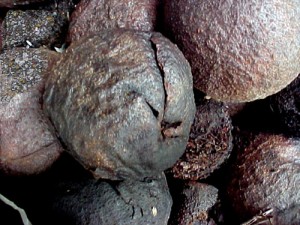 Picture 3 – Black Walnut Picture
Picture 3 – Black Walnut Picture
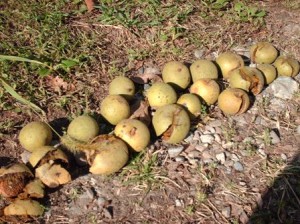 Picture 4 – Black Walnut Image
Picture 4 – Black Walnut Image
Reference:
https://www.treehugger.com/how-to-identify-common-black-walnut-1341873
http://answers.yahoo.com/question/index?qid=20111031161841AAPHo8v
http://ostermiller.org/tree/blackwalnut.html
https://www.webmd.com/vitamins/ai/ingredientmono-639/black-walnut
http://www.livestrong.com/article/120767-black-walnut-side-effects/
https://www.gardenguides.com/67702-identify-black-walnut-tree.html
- by anwiksha
- January 9th 2012

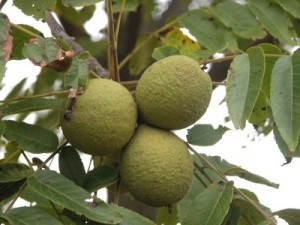
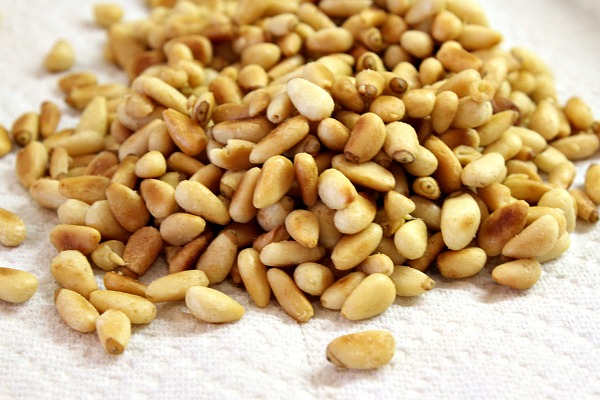

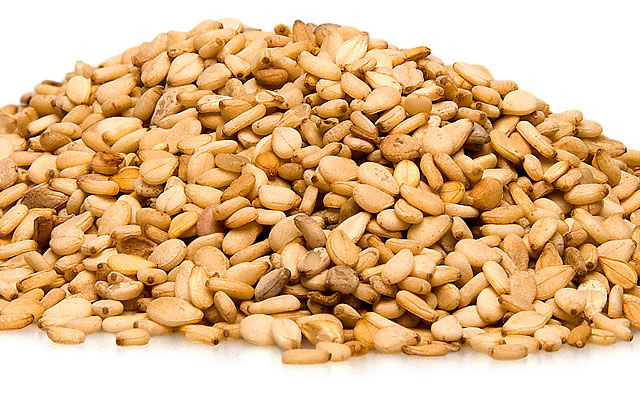
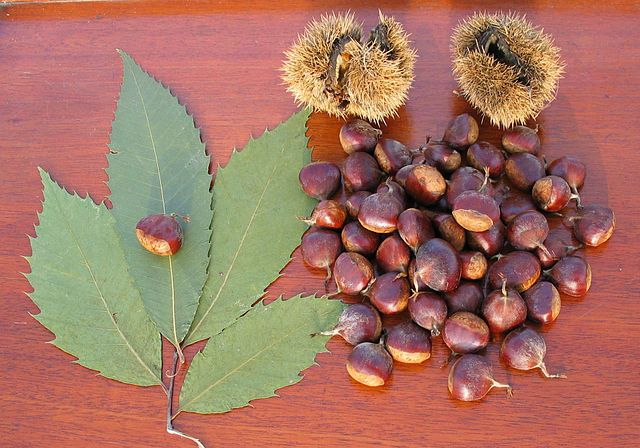

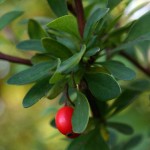
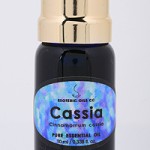
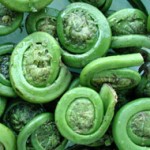

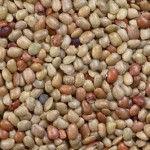
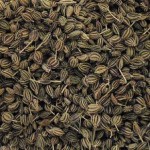

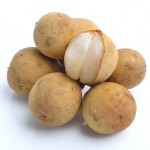

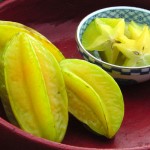
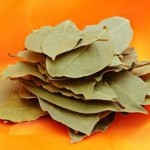
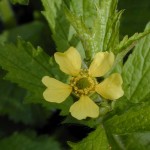
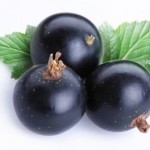
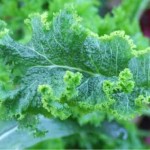
Leave a Reply